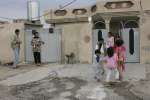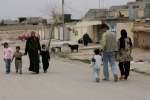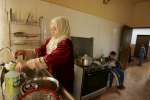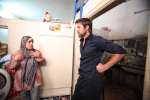IKEA Foundation helps restore sense of home for Syrian refugees in Iraq
News Stories, 30 July 2014
ARBAT REFUGEE CAMP, Iraq, July 30 (UNHCR) – Since arriving from Syria nearly a year ago, 52-year-old Halima Murad and her family have been at the mercy of Iraq's extreme weather in this camp near the northern Iraqi city of Sulaymaniyah.
In their tiny tent in the comparatively safe Iraqi Kurdistan region, the six of them have been exposed to winter temperatures dropping to zero Celsius, blistering summer temperatures of 45 degrees, and dust storms to boot. So she was particularly happy to be given a new mattress and quilt recently. "We don't have blankets for summer, only winter blankets and they are too heavy," said Halima.
Halima's family and 3,000 other Syrian refugees in this camp were some of 35,000 who came from Syria last August. Of the almost 3 million Syrians who have become refugees in the past three years, more than 250,000 have sought safety in the semi-autonomous Kurdish region of Iraq.
Halima's new mattress and quilt were part of a US$2.5 million donation of bedroom products from IKEA Foundation, the philanthropic arm of the global furnishings company. The IKEA Foundation, UNHCR's largest private donor, has previously given products to the refugee agency for Syrians in Jordan and Lebanon. This is its first donation to UNHCR in Iraq.
"When conflicts turn peoples' lives upside down, we believe in supporting children and families who have lost everything by donating IKEA products that will give them a sense of security and home," said Jonathan Spampinato, head of strategic planning and communications for the IKEA Foundation.
Refugees in Arbat Camp will get 150,000 mattresses, quilts and bed linens over the next year. The UN refugee agency will distribute 80,000 mattresses to internally displaced Iraqis who were forced out of their homes by recent fighting between armed groups and government forces. Nearly 2,000 mattresses have been delivered to families in Al Hamdaniya, in Ninewa governorate in northern Iraq.
Back in Arbat Camp, Abdu Rachman Khalil, 36, was one of the first in line to receive two IKEA summer mattresses, quilts and pillow covers.
He, his wife Sita and their six children were looking forward to sleeping more comfortably in the scorching summer heat. "We needed these mattresses and blankets," he said, herding his children away from the distribution with a mattress rolled up under each arm. "The blankets are thin and good for the summer and the mattresses are very good quality."
By Catherine Robinson in Arbat Refugee Camp, Iraq


































